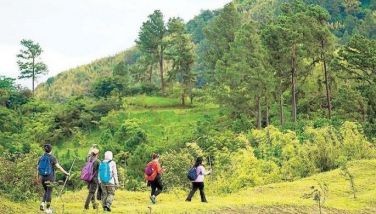Some powerful lessons from Switzerland
MANILA, Philippines - Switzerland can provide some powerful lessons in terms of water resources utilization.
Blessed with ideal conditions for hydropower generation, Switzerland sources more than half its energy requirements from nearly 600 hydropower plants that generate around 35,900 gigawatthours (Gwh) of electricity a year.
These hydro facilities, each having a capacity of at least 300 kilowatts, account for 55 percent of Switzerland’s power production, an enviable record for countries like the Philippines which rely heavily on fossil fuel-fired power plants.
Probably the most well-known hydropower facility in Switzerland is the Verzasca Dam, otherwise known as the Contra Dam for Locarno Dam. Led by First Gen vice president Estela de la Paz who is herself a former journalist, a group of senior editors from major newspapers in the Philippines came to this dam on a study tour, then crossed the border on to Lake Como in Italy where global experts were exchanging views in the Hydro 2014 International Conference.
Constructed between the years 1961 and 1965, the Contra Dam is owned and operated by Verzasca SA. At 220 meters in height, the Verzasca Dam is the fourth tallest in Switzerland and it forms the center piece of the Verzasca Hydroelectric Complex which produces 105 megawatts of electricity.
Little had been known about this dam until it was featured in a 1995 James Bond film where the main character – James Bond as portrayed by Pierce Brosnan – jumped off it in the opening scene of The Golden Eye. It was a very spectacular action sequence and was voted as the best movie stunt of all time in a 2002 Sky Movies poll.
That jump catapulted Verzasca Dam into becoming one of the world’s top bungee jumping sites which provides the bungee operator – Trekking AG – a good source of income especially during the summer season or from Easter until the end of October. For those who have the heart and the courage, Trekking AG’s brochure pegs the fee for one jump at 255 Swiss francs (a little over P12,000) for adults and 195 Swiss francs (around P9,180) for youth and students with identification cards. The fee covers a pre-jump training, a can of soft drink and a free jump at a lower elevation called The Bridge.
Dams in the Philippines may not be suitable for bungee jumping but for sure there are more than enough ideas where the operators – government or the private sector – can raise money to finance the upkeep of such facilities.
More important than bungee jumping or other supplemental money-making ventures, dams are made to form reservoirs that are mainly used for energy production, water supply for domestic human needs and for irrigation. With a favorable topography and high levels of rainfall, Switzerland made good use of its water resources to make sure that it never suffers the same problem that power deficient countries like the Philippines do.
Deriving as it already does more than half of its power supply from hydro resources, the Swiss government wants more. In its Energy Strategy 2050, the Swiss government plans to raise hydropower electricity production from the 36,000 Gwh to 37,400 Gwh by 2035 and then to 38,600 Gwh by 2050.
Two-thirds of Switzerland’s current output of hydroelectricity is produced in the mountain cantons Uri, Graubunden, Valais and Ticino where the Verzasca Dam is located.
The Swiss government, it seems, is trying to bring back the era of the 70s when they were reliant to hydropower for domestic electricity production by as much as 90 percent. With the advent of nuclear power, this went down to 60 percent in 1985 and further down to its current ratio of 55 percent. Then came the twin incidents involving first the Chernobyl plant in Russia and more recently the Fukushima plant in Japan which gave the entire world some kind of a nuclear scare. Right now Switzerland has laid down a policy to stop all construction of nuclear plants.
It is this same scare that has prompted the Philippines’ energy planners to set aside proposals for a revival of the Bataan Nuclear Power Plant project and focus instead on other renewable sources of energy.
- Latest
- Trending































